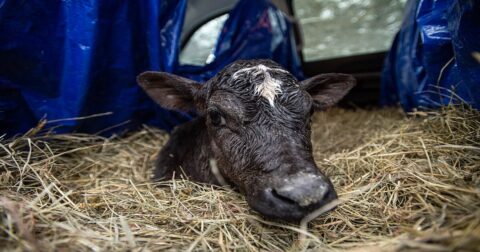Feature
Dairy and Meat Industries Push for Access to H-2A Farmworkers While the Trump Administration Slashes Their Pay
Policy•13 min read
Perspective
The first animal welfare act in modern history had its flaws, but it also galvanized action.


Words by Kim Stallwood
Two centuries ago, on July 22, 1822 to be precise, Richard Martin learned that King George IV had signed into law An Act to Prevent the Cruel and Improper Treatment of Cattle. The Galway-born U.K. parliamentarian, called “Humanity Dick” by the king, went down in history as the sponsor of the first animal welfare legislation in a modern democracy.
For good and for ill, the law laid down a new marker for animal welfare legislation. Because the Act considered some animals but not others, it didn’t disrupt the reasons why animals were exploited. In essence, the Act codified that exploitation. Yet it was also a necessary recognition that you couldn’t just do what you wanted with the animals you owned, which was a radical idea two centuries ago.
Impetuous, pugnacious, and perpetually in flight from creditors, Martin cut a distinctive figure even then. In addition to animal welfare, he campaigned for the abolition of slavery and for Catholic emancipation.
The Act’s passage was galvanizing. There were sixty-three convictions in its first year. Martin himself occasionally arrested, prosecuted, tried and sentenced malfeasants. On one occasion, he accosted a street vendor named Bill Burns and took him to court for mistreating his donkey, whose injuries he displayed to the judge and jury. Two years later, when enforcement of the Act still proved challenging, twenty-one men, including the abolitionist William Wilberforce and Martin himself, met at Old Slaughter’s Coffee House in St. Martin’s Lane, in London, to form the Society for the Prevention of Cruelty to Animals, an organization that exists to this day.
Yet Martin’s Act was limited in scope. It sought to reduce cruel and unnecessary suffering for cattle, horses and sheep, but didn’t inhibit their customary use or question whether they should be worked or eaten at all. It didn’t protect birds, whom Martin (the largest landowner in Ireland) liked to shoot, or animals who were hunted, which Martin did with relish.
Even though Martin and other aristocrats wanted the leisure activities of the urban working-class, like bear-baiting or dog-fighting, banned because they feared they corrupted their morals, they wanted the “sports” they valued (horse-racing, foxhunting, shooting, and fishing among them) to remain relatively unregulated.
For the animals covered by Martin’s Act, the situation was hardly rosy. Ultimately, mechanized transport removed cattle, oxen, horses, and sheep from city streets, where their cruel treatment and suffering were visible, to be crated inside industrial facilities and dismembered in slaughterhouses by the tens of billions — numbers that would have staggered Martin and his contemporaries.
Independent legal rights for animals are still non-existent today. In a recent legal case brought by the Nonhuman Rights Project (NhRP) to release Happy the elephant from solitary confinement at the Bronx Zoo, five of the seven judges on the New York Court of Appeals rejected NhRP’s writ of habeas corpus on Happy’s behalf. One argument used by the majority was that statutory regulations already existed to ensure Happy’s happiness: ipso facto, Happy could not be unhappy.
In his remaining years in parliament, Humanity Dick tried to ban bear- and badger-baiting, end dog fights, regulate the treatment of horses awaiting slaughter, and extend his Act to dogs, cats, monkeys, and other animals. These, and all the other welfare bills he introduced, failed. Many were considered beneath the proper concern of parliamentarians.
Nonetheless, his was the work of democracy: to persuade people that animals mattered, and that they deserved to have some rights independent of their utility to us.
Our task in the U.S. and U.K. is to continue that work: to ensure that advocates argue for animals’ welfare within all major political parties, and present a positive vegan lifestyle accompanied by campaigns for institutional change. Galvanizing the natural sciences, social sciences, and the humanities on behalf of legislative change offers a multipronged approach to animal rights.
There’s reason for some hope. In the last several decades, ethologists have demonstrated the depth and breadth of animal cognition, sociality and sentience, including with creatures—like fishes, octopuses, crustaceans, and even insects—once assumed to possess none. To assign a personal pronoun to an animal (as we do here) no longer seems weird. Legislatively, the U.K. Animal Welfare (Sentience) Act, passed in April this year, recognizes that animals have wishes, needs and desires, as to some degree did the New York Court of Appeals with Happy.
Our view of the next three decades is mixed. It may be that when we discover robots have feelings, we’ll reconsider our ruthless manipulation of beings made of flesh and blood, like us. Further development of plant-, fungal-, or cultivated-meat substitutes may curtail animal exploitation, just as the combustion engine did with horse power. The deepening climate crisis, and animal agriculture’s outsized impact on it, may force us to redirect food, water, and land toward nourishing people rather than raising animals or feedstock, or destroying biodiversity. COVID’s unmasking of the increasing spread of zoonotic diseases, antimicrobial resistance due to nontherapeutic antibiotic use, and the heartless treatment of humans and animals in industrial slaughterhouses may lead to greater awareness of how animal exploitation is a public health catastrophe, as well as an ecological disaster.
Two centuries later, we raise half a glass to Humanity Dick, recognizing that we don’t have the luxury of another two centuries to ensure the survival of any species of animal subject to this law. Especially our own.